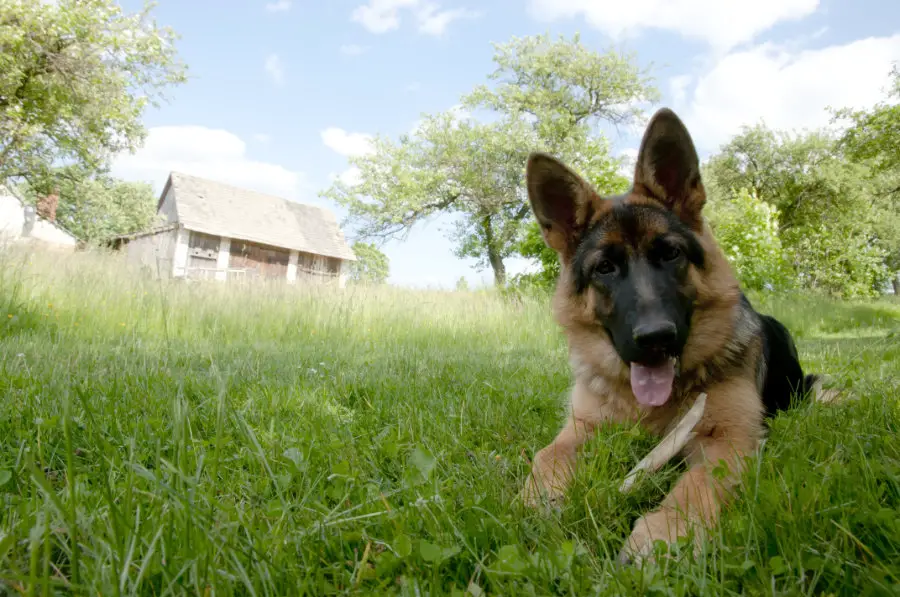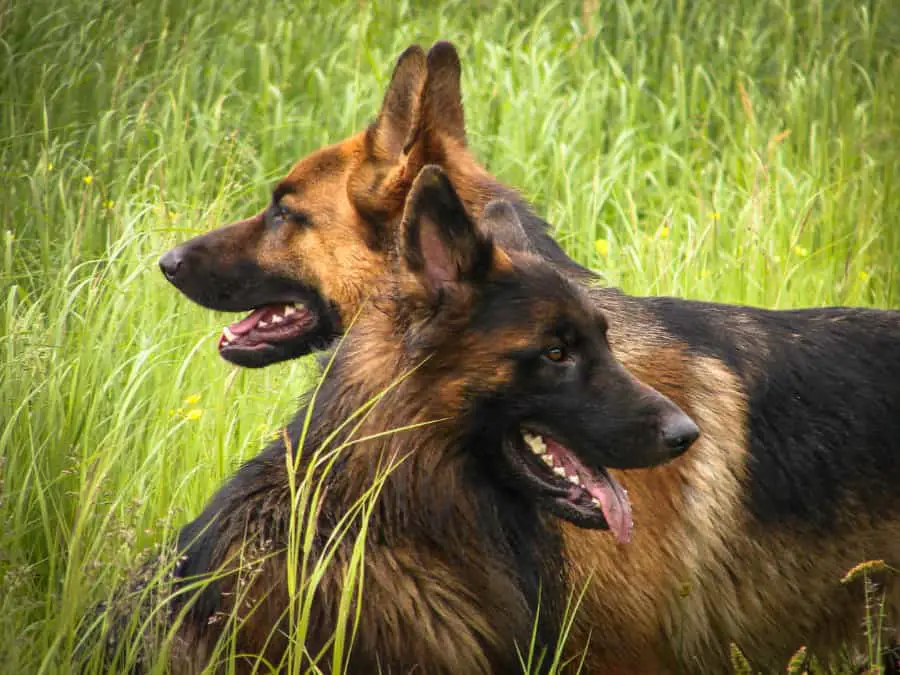German Shepherds are some of the cutest puppies in the dog world. They have floppy ears that can be a bit lopsided, and when they run, they stumble and fall over their long legs. It’s hard to imagine this little puppy can be a fierce protector and excellent guard dog. You might be wondering how they know just what to do and whether it’s an instinct, but more importantly, at what age do German Shepherds get protective?
German Shepherds become protective around six months of age. Because they are born with an instinct to guard, it might manifest earlier at around twelve weeks of age. This is when they become aware of territory and their identity within their pack and form strong bonds with their family.
Like most mammals, dogs will display a natural guarding instinct, which is especially true with mothers trying to protect their young offspring. German Shepherds are an old German breed of herding and homestead guarding dogs. For the most part, puppies from solid working bloodlines will display this natural affinity very early. As a German Shepherd owner, how would you recognize this behavior, and how do you know the difference between protective, overprotective, and aggressive? Let’s look at aspects around these traits and explore them further:

How To Identify My German Shepherd Is Being Protective
Being protective is a definite behavior that dogs display; it is identifiable by looking at the dog’s body language. German Shepherds are very expressive dogs, and it will be easy to distinguish if you know what to look for.
The German Shepherd usually has a strong sense of protection so let’s look at how they display this from as early as six months:
- The puppy is alert and listens to everything around him.
- It will watch everyone and move from room to room to check on every person in the house.
- Any strange or new object or person will be subject to an inspection, if the puppy feels the item might be a threat, he will be aloof, and his hackles can rise.
- If the puppy senses danger, he might bear teeth, growl, or bark, staying in the owner or family member’s proximity. Once it feels the threat is gone, it will become calm and do something else.
A standard error might be for new owners to discourage this kind of behavior; this will confuse the puppy later when you might need him in a situation where protection is critical. Knowing how to channel protective action will be the key to developing your dog into a trustworthy, loyal guarding companion.
Are All German Shepherds Protective?
Since most people know German Shepherds Dogs (GSDs) as police K-9 dogs and see them often in movies as service dogs, there could be a natural assumption that all GSDs are protective without fail. Unfortunately, this is not the case; many of the GSDs guarding traits have been bred out to make way for a more compliant, calm show-type dog.
GSDs are intelligent, high-energy herding and homestead guarding dogs. They represent an outstanding balance between fully functional farm working dog and home protector for many years. They need good, basic training early on to enhance the innate instincts to herd and guard. GSDs are some of the most reliable protection dogs you can find.
They need good basic obedience to channel their guarding and to be able to stop the dog at a moment’s notice. The most important aspect is that GSDs need and love lots of physical attention and exercise daily. A bored dog becomes destructive and depressed, and sometimes this leads to aggressive behavior.
Do German Shepherds Naturally Protect Their Owners?
German Shepherds want to herd and protect their owners naturally, and that is an instinct that, even through selective breeding, has not disappeared. They are usually fiercely territorial and display the typical patrolling behavior. They will often make rounds, check every room in the house, and do a perimeter check naturally when outside.
There is, however, a chance that the natural protective instincts can turn into more obsessive behavior. GSD’s can become overprotective of their owners, family members, their home, or even toys. It is always good to do regular training with your GSD; early socializing is the most crucial and foundational part of training after obedience. A GSD that is not well socialized with other animals or people could display undesirable behavior.

When Does Protective Become Overprotective Behavior?
There is a marked difference between a GSD being naturally protective and becoming or displaying overprotective behavior. Understanding the difference is crucial since GSDs can display protective, overprotective, and aggressive behavior. Let’s see how to identify it and what you can do:
- A dog that goes from protective to overprotective cannot correctly differentiate between a threat and what is not. Your reaction will assist the dog in identifying what is not a threat.
- The dog will position himself in front of you, sometimes walking side to side or static, trying to prevent even family members from getting too close. The dog will growl very loud, look for affirmation, and repeat. With basic obedience commands, this behavior should immediately be discouraged.
- Resource guarding is a common sign of overprotection, you are the source of food and nurture, and the dog might attempt to protect you possessively. This behavior should not be encouraged. Ensure feeding is done by all family members and the dog knows its place in your home. Possessive behavior is usually followed by dominance.
- Possessive behavior often leads to disrespect of boundaries; the GSD might bump you, jump up repeatedly, try to sit on you when you sit down, and not listen to any commands. This behavior needs early correction; a puppy doing silly things is cute, but a big, 70-pound dog is much harder to control.
- Male and female GSDs that become overprotective might urinate in the house or on objects. This territorial marking is a red flag and needs to be addressed immediately.
Proper puppy socializing will be invaluable to any new GSD owner. Seek expert advice on how to deal with behavioral problems should they arise.
When Does Protective Become Aggressive Behavior?
When you decided to get a German Shepherd, part of that reason might have been their natural protective instincts and abilities. They are highly trainable and intelligent. In sporadic cases, a GSD might show sudden aggression. What are some of those red flags?
- A very stiff body, walking slowly towards the person, animal, or object. The hackles are raised from the neck down to the tail and ears slightly drawn back. Head is low, and eyes are fixated.
- A deep, drawn-out guttural growl while baring teeth. This is an unmistakable sign of a warning. It can be accompanied by intermittent barking.
- A mock charge while barking, tail swaying side to side, legs widely planted and its hindquarters lowered as if to get ready for a launch. If the threat remains, the dog might engage in an attack.
- A side or full-frontal muzzle punch, usually the side punch, will result in a full-blown bite.
- Baring teeth while growling or snarling.
- A snap-type of a bite that can break the skin. Any bite from a dog is a huge red flag.
If at any time your young puppy shows signs of aggression, it is recommended to seek professional advice. Your vet can examine the dog to rule out any painful conditions or disorders. Anxiety caused by boredom in German Shepherds is a significant cause of aggressive behavior.
Which Is Better? A Male Or Female German Shepherd?
Deciding on a male or female GSD will come down to personal choice and your current home environment. Female German Shepherds are naturally more protective in a nurturing manner and easy to train, while male GSDs tend to be much more territorial and dominant. Both will make excellent choices as a guardian none the less.
Final Thoughts
Many German Shepherd owners assume that their new puppy will become a loyal protector in any situation, even without basic training. That is unfortunately not always the case. A GSD that has not been trained will often run away from danger or act entirely out of character. Often this is due to boredom and anxiety but easily remedied by training.
You can be guaranteed that your new best friend will start to show those fantastic protective qualities at the right time. When that happens, the proper training and guidance will be the keys to ensuring your GSD grows up to be a trustworthy guardian and protector.
